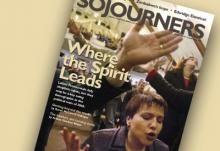Church

Rt. Rev. Mark Dyer, an Anglican bishop known for his wit as well as his wisdom, famously observes from time to time that the only way to understand what is currently happening to us as 21st-century Christians in North America is first to understand that about every 500 years the church feels compelled to hold a giant rummage sale. And, he goes on to say, we are living in and through one of those 500-year sales.
While the bishop may be using a bit of humor to make a point, his is nonetheless a deadly serious and exquisitely accurate point. Any usable discussion of the Great Emergence and what is happening in Christianity today must commence with a discussion of history. Only history can expose the patterns and confluences of the past in such a way as to help us identify the patterns and flow of our own times and occupy them more faithfully.
The first pattern we must consider as relevant to the Great Emergence is Bishop Dyer’s rummage sale, which, as a pattern, is not only foundational to our understanding but also psychologically very reassuring for most of us. That is, as Bishop Dyer observes, about every 500 years the empowered structures of institutionalized Christianity, whatever they may be at that time, become an intolerable carapace, or hard shell, that must be shattered in order that renewal and new growth may occur. When that mighty upheaval happens, history shows us, there are always at least three consistent results or corollary events.
First, a new, more vital form of Christianity does indeed emerge. Second, the organized expression of Christianity that up until then had been the dominant one is reconstituted into a more pure and less ossified expression of its former self. As a result of this usually energetic but rarely benign process, the church actually ends up with two new creatures where once there had been only one. That is, in the course of birthing a brand-new expression of its faith and praxis, the church also gains a grand refurbishment of the older one.
Christians at the Border: Immigration, the Church, and the Bible, by M. Daniel Carroll Rodas. Baker Academic.

Latino Pentecostals are increasingly seeing political action as an act of faith.
In response to a police crackdown on people living on the streets, First Presbyterian Church in downtown Dallas opened its parking lot as a safe space for homeless people to sleep—even provid
More than 150 leading African-American clergy, scholars, government officials, and health experts joined in October with the National Black Leadership Commission on AIDS to respond to HIV

Christian support for the Iraq war raises the critical question: To whom do we belong?
Call them what you will—"green nuns," "eco-nuns," or "green sisters"—but across the country Roman Catholic vowed women are actively engaged in tending and healing the earth.

With comprehensive immigration reform off the congressional agenda, the New Sanctuary Movement steps into the breach.
In "With Eyes to See" (by Bob Smietana, April 2007), megachurch leaders Kay Warren and Lynne Hybels appear to have discovered the devastating AIDS epidemic that has been raging in Africa for more t
History does not tend to be kind to Christian theologians who demand war.
In a New York Times article titled "A Catholic Debate Mounts on the Meaning of 'Just War'" published

How Britain's Traidcraft went from church hall to the London Stock Exchange, without losing the faith.

